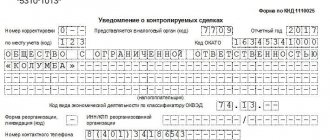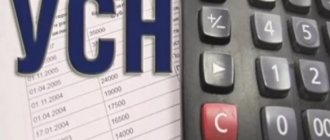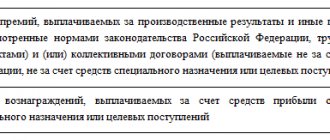The deadline for submitting a notice of controlled transactions for 2019 expires on May 20, 2021 (as of April 21, 2020). In the article, 1C experts talk about new criteria for recognizing transactions as controlled and how to prepare a notification for 2021 in “1C: Accounting 8 CORP” version 3.0, taking into account current changes in legislation.
In accordance with Section V.1 of the Tax Code of the Russian Federation, the state controls transactions through which unscrupulous taxpayers can reduce corporate income tax by manipulating the price of transactions:
- with interdependent persons;
- goods of global exchange trade;
- with persons registered in offshore companies.
Taxpayers (legal entities and individuals) who made transactions of this kind in 2019 must submit a notification of controlled transactions to the tax office at their place of registration no later than May 20, 2020. Based on such submitted notifications, tax authorities check controlled transactions between related parties and transactions equivalent to them. Control may include both the subject of the transaction and its price, as well as the terms of delivery of goods (work, services, property rights).
For failure to submit a notification within the prescribed period or incorrectly filling out a notification, the Tax Code of the Russian Federation provides for administrative liability in the form of a fine in the amount of 5,000 rubles. (Article 129.4 of the Tax Code of the Russian Federation).
| 1C:ITS For more information about which persons are recognized as interdependent and which transactions are recognized as controlled, as well as what consequences the conclusion of these transactions may lead to, see the “Business Directory: Legal Aspects” section “Legal Consultations”. |
What are the main criteria for controlled transactions in 2020?
Controlled transactions are subject to verification by the Federal Tax Service to determine the presence or absence of intentions of the participants in the relevant transactions to evade taxes (reduce them) through unjustified manipulations with prices for goods and services that are the subject of agreements.
Thus, by reducing the price in the contract, the payer can reduce the tax base, and by increasing it, it can increase the base for calculating VAT deductions and inflating expenses. These actions are illegal. In the general case, transactions between related parties and transactions equivalent to such are considered controlled (clause 1 of Article 105.14 of the Tax Code of the Russian Federation). At the same time, dependent companies for the purpose of determining the controllability of transactions include companies that meet the criteria specified in Art. 105.1 of the Tax Code of the Russian Federation, and for the purposes of recognizing transactions between them as controlled by Art. 105.14 of the Tax Code of the Russian Federation establishes certain criteria. The range of these criteria is very wide. Further in special sections of the article we will consider their essence in more detail.
Transactions in which “unnecessary” intermediaries are involved, transactions in the field of foreign trade in goods of global exchange trade, and some others can be considered controlled. In addition, the court may recognize the transaction as controlled at the request of the Federal Tax Service (clause 10 of Article 105.14 of the Tax Code of the Russian Federation).
Subjects of controlled transactions in various combinations may be interdependent or equivalent to such:
- tax residents and non-residents of the Russian Federation;
- Russian companies;
- foreign companies.
It is worth noting that the subjects of control by the Federal Tax Service (for the same violations that we mentioned at the beginning of the article) can, theoretically, be not only interdependent persons, but also any other persons who have given reason to the tax authorities to draw attention to themselves - for example, having carried out an unreasonable underestimation or overestimation of prices in contracts (letter of the Federal Tax Service dated November 2, 2012 No. ED-4-3/18615). However, the courts are not very friendly towards inspections by the Federal Tax Service of persons who are not dependents (decision of the Supreme Court of the Russian Federation dated 01.02.2016 No. AKPI15-1383).
Check whether you have correctly defined the criteria for controlled transactions using the Ready-made solution from ConsultantPlus. If you don't have access to the system, get a free trial online.
Recognition of persons as interdependent
In order for persons to be officially recognized as interdependent, the degree of real participation in capital and the possibility of its change are analyzed. This aspect is usually influenced by the terms of the previously concluded agreement, as well as the ability of a certain person to otherwise influence the decisions made by people important to the transaction.
Related parties include:
- Organizations if at least one company participating in the transaction takes part in the work of another company. This aspect is taken into account only if the share of total material investments in a third-party company is more than 25%. Both direct and indirect participation matters.
- Organization and individual, if any of these participants in the transaction has a stake in another company. It must be at least 25% of the total assets.
- Organizations, subject to the participation of any third party in their activities, with more than 25% of assets. It is important that the share of participation in both companies exceeds this mark.
- Organizations, if their structure has executive bodies that were appointed or approved for their positions by the same person. Only sole executive bodies elected by one person or groups of them are relevant, provided that a specific person oversaw their formation in all firms participating in the transaction, at least 50% of the total composition.
- The organization and its executive body that, for any legal reason, arranged the transaction.
The parties to any transaction can recognize themselves as interdependent if they consider that the taxation procedure adopted for such cases is most optimal for them. At the same time, they are required to prove that their relationship has a direct or indirect impact on the amount and outcome of the transaction.
Many firms conduct controlled transactions quite often. The criteria for identifying them vary, but they must be taken into account to ensure the validity of each contract. Where all the pretexts under which a controlled transaction can be carried out are recorded is Article 105 of the Tax Code of the Russian Federation.
Controlled transactions - 2021: criteria in tabular form
Our specialists have developed a special table for you, which details the grounds for classifying certain categories of participants in legal relations in business (tax residents of the Russian Federation, non-residents of the Russian Federation, interdependent persons, equivalent to dependent persons) as subjects of controlled transactions. This table, adapted for controlled transactions, contains 2021 criteria that a business owner can use to evaluate his contracts for additional interest from the Federal Tax Service.
| Subjects of transactions | What kind of transaction can be considered for controllability? | Criteria for classifying a transaction as controlled | Sources of law that collectively establish the procedure for classifying transactions as controlled |
| Interdependent persons who are residents of the Russian Federation | Any transactions between such persons, if the amount of income on them for the year exceeds 1 billion rubles. and one of the conditions specified in the following column is met |
| Art. 105.1 Tax Code of the Russian Federation; subp. 1 item 2 art. 105.14 Tax Code of the Russian Federation; clause 3 art. 105.14 Tax Code of the Russian Federation |
| Art. 105.1 Tax Code of the Russian Federation; subp. 2 p. 2 art. 105.14 Tax Code of the Russian Federation; clause 3 art. 105.14 Tax Code of the Russian Federation | ||
| Art. 105.1 Tax Code of the Russian Federation; subp. 3 p. 2 art. 105.14 Tax Code of the Russian Federation; clause 3 art. 105.14 Tax Code of the Russian Federation | ||
| Art. 105.1 Tax Code of the Russian Federation; subp. 4 p. 2 tbsp. 105.14 Tax Code of the Russian Federation; clause 3 art. 105.14 Tax Code of the Russian Federation | ||
| Art. 105.1 Tax Code of the Russian Federation; subp. 6 paragraph 2 art. 105.14 Tax Code of the Russian Federation; clause 3 art. 105.14 Tax Code of the Russian Federation; Art. 275.2 Tax Code of the Russian Federation | ||
| Art. 105.1 Tax Code of the Russian Federation; subp. 8 paragraph 2 art. 105.14 Tax Code of the Russian Federation; clause 3 art. 105.14 Tax Code of the Russian Federation | ||
| Art. 105.1 Tax Code of the Russian Federation; subp. 9 paragraph 2 art. 105.14 Tax Code of the Russian Federation clause 3 art. 105.14 Tax Code of the Russian Federation | ||
| Art. 105.1 Tax Code of the Russian Federation; subp. 10 paragraph 2 art. 105.14 Tax Code of the Russian Federation clause 3 art. 105.14 Tax Code of the Russian Federation | ||
| Any persons in transactions equivalent to transactions between related parties | Transactions involving intermediaries | Transactions are considered controlled if:
| Clause 1 Art. 105.14 Tax Code of the Russian Federation; subp. 1 clause 1 art. 105.14 Tax Code of the Russian Federation |
| Transactions with global exchange trade goods | Transactions are considered controlled if:
| Clause 3 Art. 105.14 Tax Code of the Russian Federation; sub. 2 p. 1 art. 105.14 Tax Code of the Russian Federation; clause 5 art. 105.14 Tax Code of the Russian Federation; clause 7 art. 105.14 Tax Code of the Russian Federation; letters of the Ministry of Finance of the Russian Federation dated 02.19.2019 No. 03-12-11/1/10545, dated 03.19.2018 No. 03-12-11/1/16985, dated 10.03.2012 No. 03-01-18/7-135, dated 04.09 .2015 No. 03-01-11/51070 | |
| Transactions between persons, one of whom is registered or operates in a country from the list approved by Order of the Ministry of Finance of the Russian Federation dated November 13, 2007 No. 108n | Transactions are considered controlled if their turnover exceeds 60 million rubles. in year | Art. 105.1 Tax Code of the Russian Federation; clause 3 art. 105.14 Tax Code of the Russian Federation; subp. 3 p. 1 art. 105.14 Tax Code of the Russian Federation; clause 7 art. 105.14 Tax Code of the Russian Federation | |
| Any persons who are interdependent (equated to interdependent) with a person who is not a tax resident of the Russian Federation | Any transactions between persons who are recognized as interdependent in accordance with Art. 105.1 of the Tax Code of the Russian Federation or equated to interdependent ones in accordance with paragraph 1 of Art. 105.14 Tax Code of the Russian Federation | Transactions are considered controlled if their turnover exceeds 60 million rubles. in year | Clause 1 Art. 105.14 Tax Code of the Russian Federation; clause 3 art. 105.14 Tax Code of the Russian Federation; letters of the Ministry of Finance of the Russian Federation dated October 3, 2012 No. 03-01-18/7-135, dated September 4, 2015 No. 03-01-11/51070 Letter of the Federal Tax Service dated August 17, 2017 No. ZN-4-17/ [email protected] |
ATTENTION! Starting from 2021, UTII will cease to be valid throughout Russia. Some entities abandoned the special regime as early as 2021. Read more about the cancellation of UTII here.
The transactions specified in clause 4 of Art. 105.14 of the Tax Code of the Russian Federation, in particular:
- between participants of one consolidated group of taxpayers;
An exception is transactions with extracted mineral resources, taxed at a percentage rate, as well as transactions for which income (expenses) are taken into account when calculating the tax base for the tax on additional income from hydrocarbon production.
- between persons who simultaneously:
- registered in one subject of the Russian Federation;
- do not have OP in other constituent entities of the Russian Federation, outside the Russian Federation;
- do not pay income tax to the budgets of other constituent entities of the Russian Federation;
- there are no conditions for recognizing transactions as controlled according to the criteria established by sub. 2-6 p. 2 tbsp. 105.14 Tax Code of the Russian Federation;
- have no losses (including losses from previous periods carried forward to future periods);
- for the provision of sureties (guarantees), if all parties are non-banking Russian organizations;
- for the provision of interest-free loans between interdependent persons - residents of the Russian Federation, etc.
Having considered what criteria have been established for controlled transactions in 2021, we will study such an aspect of the relationship between taxpayers and the Federal Tax Service as reporting under relevant contracts.
Interest-free loan
Interest-free loans between interdependent legal entities serve for simple redistribution of funds within a group of companies. Such transactions are not prohibited by law. However, they also entail tax risks. The latter refers to the possible additional charge of income tax.
The lender's taxable income is established based on the amount of interest that could hypothetically be received in a similar transaction with an outside entity. That is, you need to turn to comparable transactions. The corresponding provision is contained in paragraph 1 of Article 105.3 of the Tax Code of the Russian Federation.
The interest-free transaction creates income for the lender, which will be subject to income tax. This means that interest will have to be paid in any case. For the debtor, receiving an interest-free loan does not generate income. The financial benefit received does not increase the tax base. The corresponding rule is contained in the letter of the Ministry of Finance No. 03-03-06/1/5149 dated February 9, 2015.
The following scheme is possible: one subject takes out a loan from a bank. Funds in the form of an interest-free loan are transferred to the dependent entity. In this case, tax representatives may recognize the resulting benefit as unjustified. However, if such a redistribution of funds does not contradict the Tax Code, it is possible to make an arbitration decision in favor of the subject. An example of this is the resolution of the AS SZO No. A56-60966/2014 dated July 1, 2015.
What kind of reporting is established for controlled transactions (“1C” and unified forms)
In accordance with clause 2. Art. 105.16 of the Tax Code of the Russian Federation, participants in controlled contracts must send a reporting document - a notification - to the tax service. The deadline for sending it at the end of the year is May 20 of the year following the reporting year. In 2021, this document is drawn up according to the form that was approved by Order of the Federal Tax Service dated July 26, 2019 No. ММВ-7-13/ [email protected] You can download it on our website in the material Notification of controlled transactions: new form .
This form includes:
- a title page that reflects information about the taxpayer - individual entrepreneur or legal entity;
- sections 1A and 1B, which record information about each of the controlled transactions (groups of transactions);
- sections 2 and 3, which record data on the taxpayer’s counterparties under controlled contracts (groups of contracts).
You can fill out the notification either manually or using popular accounting programs such as 1C. You can send it to the Federal Tax Service on paper or electronically via TKS.
transfer pricing
The transfer price is the price established in business transactions between different divisions of a single company or between members of a single group of companies. The activity of setting prices between such companies is called transfer pricing. Transfer prices allow the total profits of a group of individuals to be redistributed to individuals located in states with lower taxes. This is the simplest and most common scheme for minimizing taxes paid.
Transfer pricing is regulated by Section V.1 of the Tax Code “Interdependent Persons. General provisions on prices and taxation. Tax control in connection with transactions between related parties. Agreement on Pricing”, which provides for the powers of the Federal Tax Service of Russia to control prices in transactions between related parties.
a seminar will be held in Moscow , where they will tell everything about transfer pricing using easy-to-understand examples. The information will be of interest to both beginners in these matters and professionals. Come.
Results
The legislation of the Russian Federation defines a wide range of potential subjects of controlled transactions. They can be both Russian and foreign companies operating in the Russian Federation. In most cases, they will be interdependent with or equivalent to interdependent with their transaction partners. Until May 20 of the year following the reporting year, taxpayers must report to the Federal Tax Service on controlled transactions.
Sources:
- Tax Code of the Russian Federation
- Order of the Federal Tax Service dated July 26, 2019 No. ММВ-7-13/ [email protected]
You can find more complete information on the topic in ConsultantPlus. Free trial access to the system for 2 days.
Related Persons
The Tax Code clearly defines the basic definitions regarding the concept of “controlled transaction”. This is the recognition of both individuals and legal entities as interdependent, which affects tax results. This definition is assigned only to those types of transactions where the relationship between the two parties has a direct impact on the terms and final results of the negotiations. This aspect is very important for tax legislation, since the financial component of transactions depends on the results of agreements, part of which is always sent to the state treasury.







